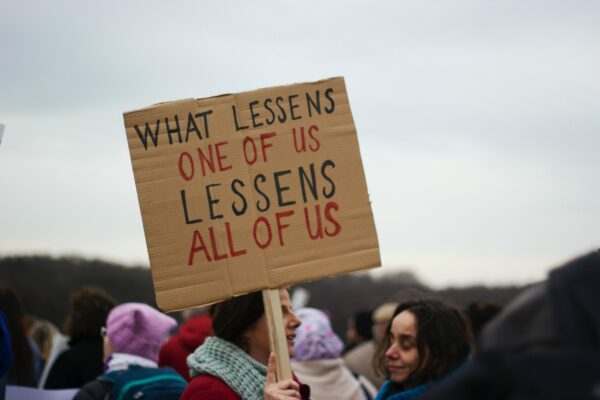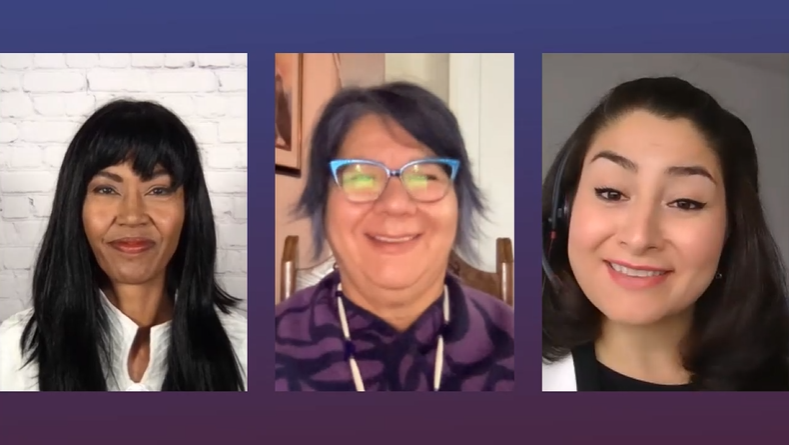
The Equal Futures Network is a community of national, regional, local and grassroots organizations, agencies, civil society and projects from across Canada that are committed to social justice, advancing gender equality and to ensuring equal futures for all. This blog was contributed by one of our Community Partners.
In late January, early February of 2021, I had the privilege of joining the official Canadian delegation to the G7 Youth Summit, colloquially known as the Y7. Between months of gruelling early mornings, challenging negotiations with our Y7 counterparts, and last-minute policy developments, our team consistently showed their commitment and persistence to elevating the voices of Canadian youth at the highest levels of government and diplomacy.
Throughout consultations with youth across Canada, discussions with industry experts and leaders, domestic ministers and G7 Sherpas, one thing continued to ring true: we cannot move forward in building back better from COVID-19 without the inclusion and active participation of young people.
In ensuring that no country is left behind, the Canadian Y7 delegation put forth bold proposals which provided equitable responses that recognize racial, gender, and economic disparities amongst youth and significant populations.
Following the Y7 and G7 summits in late June, I sat down with my delegation to discuss their experiences developing bottom-up approaches to facilitating gender-equitable responses to Y7 and G7 commitments.
Why is it essential to advance gender equity at home and what has this looked like at the multilateral level?
“When we are addressing gender equality, it is vital to consider all the assets including safety, economy, technology, health, leadership or wellbeing,” Mojann Zibapour, Y7 Head Delegate and Digital and Technology representative shared.
“The reality is, whether we are considering the domestic or international lens, gender equality benefits everyone. The political hurdles that women have long faced are still ongoing, and women’s participation in politics is still minimal, even amongst G7 countries. Mainstreaming fair representation and participation of women in public life and positions of power is crucial to realizing gender equality both domestically and at a multilateral level. We can start by giving special attention to the needs and vulnerabilities of women and gender diverse individuals’ health, psychosocial, and work environments”
How did the Canadian delegation funnel its efforts to bring gender equity to the forefront at the Y7?
Rahul Pallan, Engagement Coordinator and Economy representative, noted that “The Canadian Y7 delegation looked to Canada’s feminist international assistance policy as a starting point for our policy recommendations and a foundation for our arguments in the negotiations process.”
Pallan noted that “[The Canadian delegation] worked with other Y7 delegations to ensure that we had support for initiatives like the Global Partnership for Education (GPE), which in part focuses on uplifting women and girls by providing meaningful and consistent access to education in communities around the world. We also focused on world hunger as a priority, recognizing that we could leverage the work of the United Nations World Food Programme (WFP) as a means of giving women the power in their communities to provide for their families, explore entrepreneurial opportunities, and give women a key and enhanced role in society with the ability to participate in the economy as stakeholders in budding financial systems.”
He continued by sharing that “In the context of advanced economies, we relied on data from institutions like the Organisation for Economic Co-operation and Development (OECD) and the work of our counterparts at the Labour 7 to propose policies that would highlight the egregious pay gaps and access to opportunity across the G7 for women and girls. Through these initiatives and so many more, we ensured that Canada re-established itself as a champion for all, especially the marginalized and disadvantaged, by focusing on gender.”
Why is it important for young people, especially women and gender-diverse youth, to be involved in high-level political processes such as the Y7 and G7?
“Youth have a huge role in ensuring that gender equality is prioritized both nationally and internationally,” said Zibapour.
“[It is important to take] advantage of your own platform to advocate and promote gender equality and equity. When we consider topics such as education or employment, there are undeniable realities hindering girls’ access to these spaces. Currently, over 132 million girls are out of school, and UNICEF reports that in countries affected by conflict, girls are more than twice as likely to be out of school than girls living in non-affected countries. With such drastic gender inequalities for youth, we need leaders to create spaces where youth are empowered to be agents of their own change.”
To dismantle the male-dominated systems of foreign aid, trade, immigration, peace and security, feminist foreign policy is increasingly gaining traction within the G7.
From a Y7 perspective, how can we address gender equity with an intersectional approach?
“The global system is hierarchical and patriarchal,” stated Carla Guillaume, Inclusion Coordinator and Climate and Environment representative.
“Therefore, it is encouraging to see powerful countries like Canada, France and others recognize that it is important to increase our commitments to gender equity as a principle of foreign policy, but also a funded goal. However, we have seen that feminist foreign policy in its current form has many shortcomings. Feminist foreign policy tends to focus on women and girls and sometimes fails to recognize that gender equality is not just about woman empowerment. Historical legacies of colonization and military intervention are still shaping foreign policy across the G7. I can say that young people have been doing a lot of work to change the narrative, to make sure policies, whether they are domestic or foreign, take into account intersecting forms of discrimination and marginalization based on race, ethnicity, disability, sexual orientation, class or refugee status while also being reflective of the cultural and social realities of the different communities impacted.”
This year, in the Y7 communique, delegates made it clear that the climate crisis needs to be addressed with a gendered and intersectional lense, by focusing on climate finance access, crisis management and adequate training and education for vulnerable communities.
Why do you think gender equity and protection of the environment go hand in hand?
The fight against climate change is a good example of why it is so important to address global challenges with an intersectional lens. First, it is vital to recognize that, in rich and less developed countries, environmental and climate injustices are gendered. The impacts of environmental degradation disproportionately affect women, whether it is through poor housing, inadequate access to transportation, food insecurity, stress, heat exposure, power interruptions or toxic exposure. When we talk about climate and foreign policy, it is vital to understand the power structures within our societies by addressing the barriers that affect different categories of people across the intersectionality spectrum and by making sure that our green transition plans also advance gender equity in our communities. To get there, we must ask ourselves the following questions: ‘ Is our approach to the global climate crisis benefiting one small group of people while failing to challenge the privileged positions and structures that perpetuate environmental injustices? How are these policies empowering women and gender-diverse individuals to participate in the decision-making process? Through those policies, are we mobilizing the necessary resources for research, learning, environmental policy support, monitoring and evaluation that put women at the center?’
Looking beyond the G7 and Y7, what are the biggest challenges for gender equality in the future and how can youth leaders prepare to overcome those challenges?
“I think we all need to recognize that progress is something that should be safeguarded and that as a society, we need to constantly work to maintain that progress. Girls, women and many gender diverse folks are often the first to be impacted by crises like economic recessions, pandemics, or natural disasters.”
Guillaume continued by noting that “COVID-19 [has driven] an alarming number of women out of the workforce, which is a huge blow to gender equality and gender justice” and that “COVID-19 has had considerable impact on the access to quality health care services as seen in the inequitable vaccine distribution, poor access to quality health services, and a decrease in access to maternal and reproductive health care.
“Young people need to be very alert to major events that threaten to exacerbate inequalities, and we should not be afraid to ring the alarm when progress is compromised in any shape or form, even when it is not obvious. Also, I want to add that many people are still convinced that gender equality is a non-issue, and as young leaders, we must normalize engaging in discussions with people who disagree with us. We live in a very polarised world, and we can all grow from understanding other people’s perspectives. We can’t address pushback without those honest conversations, and we need to recognize that our understanding of gender equality can never be one size fits all. It’s just part of the game.”
Lastly, I asked the delegates to share advice for young people looking to advance gender equity in their communities.
Pallan shared that “young leaders need to take a moment and step back for serious self-reflection” and continued by noting that advancing gender equity “starts by recognizing the advantages or disadvantages you face on a personal level navigating society in Canada and the world.”
Pallan shared that “by meaningfully reflecting on your outlook, your position, and your ability to access opportunity, only then can you start the work of uplifting those around you while helping others understand the importance of creating spaces and systems that advance gender equity in community and domestically.”
“Making space for women and marginalized groups, ensuring that your voice is not the only heard on issues that affect us all, especially when you have a platform like the Y7, creates a broader dialogue and exchange of foundational ideas to more inclusive communities. Our communities only thrive when everyone in them has the opportunity. Finally, we must look for outdated practices, processes, and systems designed to keep women and marginalized communities from opportunity. We need bold reforms, and that starts with individuals speaking up and offering solutions that bring everyone under the same standards and systems, not privileged access and systems for ‘everyone else’.”
It’s clear from our conversations with each delegate that it is not merely enough for decision-makers to utilize the language of gender equity, but rather, be intentional in bringing forth sustainable investments, those with lived experiences to the decision-making table, and, of course, centring the voices of young people in the co-development of policies intended to serve youth.
Ultimately, while opportunities such as the Y7 are instrumental in creating spaces that are for-youth, by-youth, we still have a long way to go to ensure meaningful involvement of youth at community, domestic, and global levels. For decades, young people have continued to advocate for their rightful place at the table, and we will continue to do so in envisioning a more equitable, just, and transformative future for generations to come.
Author
Erika Dupuis (They/She)
Communications Coordinator and Health Representative for the Canadian Delegation to G7 Youth Summit (Y7) 2021
Erika is a practicing frontline Social Worker in the Greater Toronto Area. Erika is a graduate of the Master of Social Work program at Ryerson University, a recipient of a Post-Master’s Certificate from New York University, and is currently a Leading Social Justice Fellow at the University of Toronto. With experience in community development and youth engagement, Erika has supported several youth-led organizations aimed at advancing youth health equity.
The Canadian Delegation to the Y7 is coordinated by Young Diplomats of Canada. Young Diplomats of Canada (YDC) is a national, non-partisan, non-profit organization that promotes the leadership of young Canadians through international delegations, research projects, and advocacy initiatives.
The Equal Futures Network acknowledges that Indigenous people are the traditional guardians of Turtle Island, on the land also known as Canada






